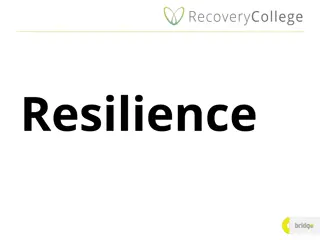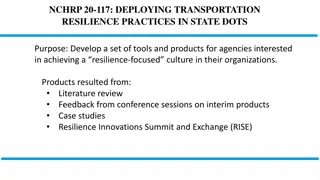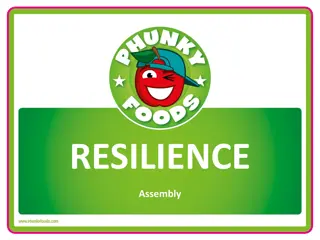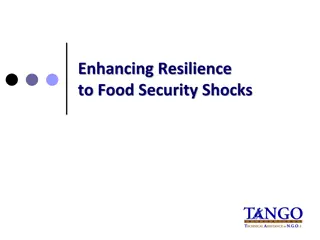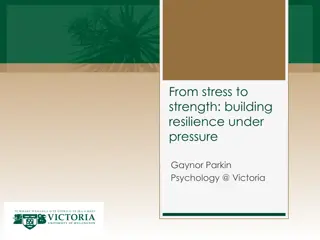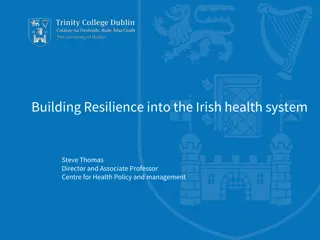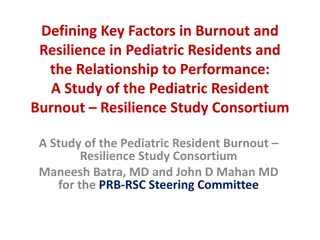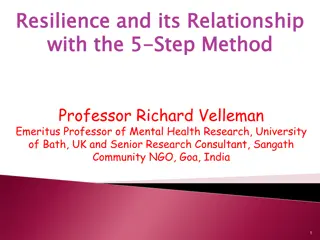Understanding Resilience and Its Importance in Overcoming Adversity
Resilience is the ability to bounce back from challenges and grow stronger. It is crucial for processing hardships, managing emotions, and avoiding unhealthy coping mechanisms. Real-world examples like Colonel Sanders and Paralympian Michael McKillop show how resilience is key to achieving success despite setbacks.
Download Presentation

Please find below an Image/Link to download the presentation.
The content on the website is provided AS IS for your information and personal use only. It may not be sold, licensed, or shared on other websites without obtaining consent from the author. Download presentation by click this link. If you encounter any issues during the download, it is possible that the publisher has removed the file from their server.
E N D
Presentation Transcript
Building resilence Emotional wellbeing session 8
The word resilience derives from the Latin word resilire which means to leap back. The National Scientific Council on the Developing Child (2015) describes resilience as a positive, adaptive response in the face of significant adversity . Further definitions also refer to resilience as the capacity to face, overcome and ultimately be strengthened by life's challenges and adversities . Why is resilience important?
Importance of resilience Resilience is important because it gives people the strength needed to process and overcome hardship. Those lacking resilience get easily overwhelmed by hardship, find it difficult to process emotions, and may revert to unhealthy coping mechanisms. These unhealthy coping strategies include substance abuse, social isolation and can create mental health issues. Therefore, it is essential to create resilience. But how?
Real world examples? Let's link resilience to real world application. Can you think of some individuals that you would categorise as resilient? Why would you describe them as resilient?
Tutor example of a resilient person Colonel Harland Sanders (founder of KFC) At 65 he was on social security and living off a small sum of monthly aid. He tried to sell his recipe and chicken to restaurants across America without any success. He had 1009 rejections before his proposal was accepted. Despite setbacks, he continued to preserve, showed resilience and eventually succeeded.
Michael McKillop Paralympian from NI Not all examples have to be celebrities or international figures. Michael was diagnosed with Cerebral Palsy at age 2. However, Michael was a keen runner and started running at an early age. At age 15, he was diagnosed with Epilepsy. This meant his training had to be tailored or he could take a fit that would leave him bed bound for days. Before the 2016 Olympics, Michael was seriously affected by Mental Health issues. He stated that Winning races made me forget about it for a bit, but then you would go back to your room and think, 'That's another high gone, where is the next one going to come from.' I was at breaking point. I couldn't go on; I was thinking about giving up on life .
Michael stated that he eventually got in touch with my GP and he put me in touch with a psychiatrist. I hid the letters from my parents. I would get them sent to my GP and he would organise another appointment with the psychiatrist. I broke it off with my wife, who was then my girlfriend, around that time. I pushed her away. I was selfish. She has since said that I should have told her, and we could have worked through it but someone with mental health issues doesn't think about it like that. I think athletes need to understand that it's okay to feel sad and down, but the most important thing is that you must reach out. You have to talk about it when not everything is rosy in the garden." (independent.ie, 09 Feb 2020) Despite the physical and mental adversity that Michael experienced, he won x4 Gold Olympic medals, x4 IPC World Championships, x2 European Championships, and a higher education degree.
How to build resilience There are various ways you can build resilience and learn how to better manage your emotions. Editing your outlook and looking at the positive aspects of a situation rather than dwelling on negatives. This also promotes positive thinking and optimism. Reach for support: keeping your stressors and emotions built up can create unnecessary hardship. However, sharing this with friends or family can make the situation more management.
The 7 components that make up resilience The 7 Cs acts as the building blocks on what is needed to become resilient. https://www.youtube.com/watch?v=hIo4ur5sfK0
Competence this refers to what strategies you have adopted to help you overcome hardship. For example, self-talk, breathing techniques or meditation. Confidence- when you are confident in your own ability and strengths, you are more motivated to overcome challenges. Connection- having a strong circle of support is extremely important to develop resilience. Those that have less support are more likely to engage in self-destructive behaviours. Character- this refers to young people adopting wise values that they are comfortable sticking to. Contribution if you can contribute to something positive, you are more inclined to experience a sense of purpose and feel that your influence is valued. This means that when challenges occur, you understand your self- worth. Coping a major component of coping with stressors is having the social skills to seek help. Control young people that have control over their actions and decisions are more inclined to show adversity through accountability.
How to build resilience GOAL SETTING BREATHING TECHNIQUES SELF CARE HAVE A GROWTH MINDSET SEEK SUPPORT POSTIVE SELF TALK
Case study 1 You have an exam coming up for your GCSE/A-Level and were tasked with completing homework. You forgot to complete this which resulted in a detention. How would a resilient individual react in this situation? What would you do?
Case study 2 You recently applied for a new job and submitted applications for 10 roles. You dedicated a lot of time into completing the 10 applications and got one interview. However, unfortunately you were unsuccessful but received written feedback. How would you typically react to this and how would a resilient person react?
Confidence, confidence and coping This activity will help you uncover the strengths that you will have so that when challenges occur, you are more confident and competent to cope with adversity. Individually, write down one difficult situation or challenge that you had to overcome and write down the qualities you had to display. For example, I was able to overcome this specific challenge because .
Do not judge me by my success, judge me by how many times I fell down and got back up again. Nelson Mandela Rock bottom became the solid foundation in which I rebuilt my life. J.K. Rowling If you re going through hell, keep going. Winston Churchill My barn burned down, now I can see the moon - Mizuta Masahide (Japanese samurai)
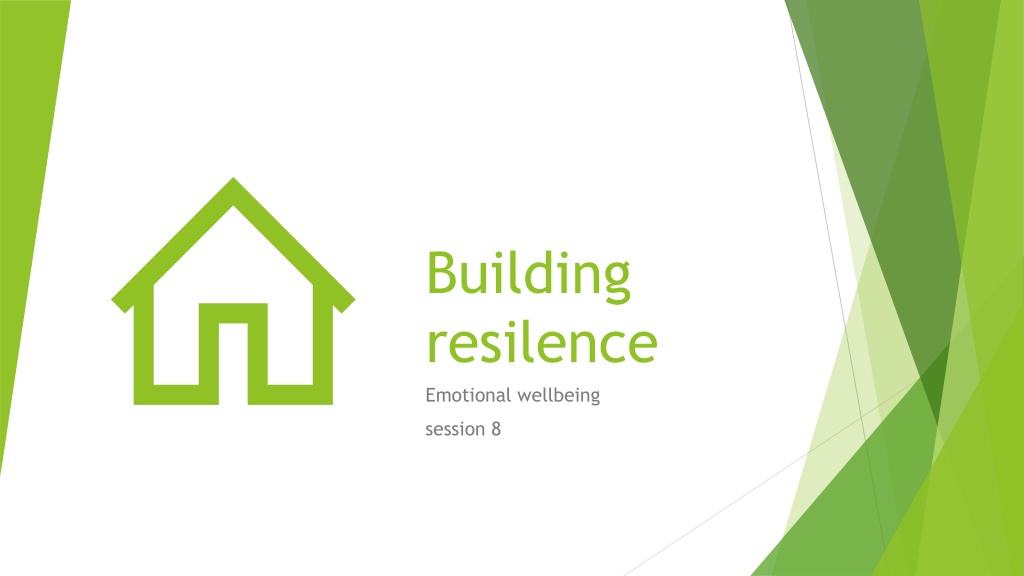
 undefined
undefined











